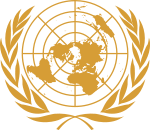- United Nations Commission on the Status of Women
-
"Commission on the Status of Women" redirects here. For the U.S. presidential commission, see Presidential Commission on the Status of Women.
The Commission on the Status of Women (CSW or UNCSW) is a functional commission of the United Nations Economic and Social Council (ECOSOC), one of the main UN organs within the United Nations.Every year, representatives of Member States gather at United Nations Headquarters in New York to evaluate progress on gender equality, identify challenges, set global standards and formulate concrete policies to promote gender equality and advancement of women worldwide. UN agencies actively followed their mandates to bring women into development approaches and programs and the conferences. They participate at the prepcoms, design strategy, hold caucus meetings, network about the various agenda items being negotiated in the different committees, and work as informed lobbyists at the conferences themselves. The CSW is one of the commissions of the UN that do not limit participation to states only. For example, NGOs are also allowed to participate in sessions of the CSW, attending caucuses and panels and organizing their own parallel events through the NGO Committee on the Status of Women, NY (NGO CSW/NY).[1] This is particularly important for contested territories such as Taiwan, which is not a member of the UN. In the past few years, NGOs from Taiwan (such as the National Alliance of Taiwan Women's Associations) have been able to participate in the CSW sessions.The Commission consists of one representative from each of the 45 Member States elected by the Council on the basis of equitable geographical distribution: thirteen members from Africa; eleven from Asia; nine from Latin America and Caribbean; eight from Western Europe and other States and four from Eastern Europe. Members are elected for a period of four years. Among its activities, the CSW drafted several conventions and declarations, including the Declaration on the Elimination of Discrimination against Women in 1967 and women-focused agencies such as UNIFEM and INSTRAW. Some groups that sponsor parallel events or caucuses at the commission have advocated population control, reproductive rights and contraception, while at the same time criticizing the position of the Roman Catholic Church on sexual morality and fertility.[2]
Contents
The Bureau
The Bureau of the Commission plays an important role in guiding proper preparation for, and in making sure that the annual sessions of the Commission are successful. Bureau members serve for two years.[3]
History
It was established in 1946 as a mechanism to promote, report on and monitor issues relating to the political, economic, civil, social and educational rights of women. It was a unique official structure for drawing attention to women’s concerns and leadership within the UN. The Commission on the Status of Women first met at Lake Success, New York, in February 1947. All of the 15 government representatives were women which separated the Commission from other UN movements and through history continues to maintain a majority of women delegates. During its first session, the Commission declared as one of its guiding principles:
to raise the status of women, irrespective of nationality, race, language or religion, to equality with men in all fields of human enterprise, and to eliminate all discrimination against women in the provisions of statutory law, in legal maxims or rules, or in interpretation of customary law.
Contributing to the drafting of the [Universal Declaration of Human Rights] became one of the first tasks. Commission members inserted gender-sensitive language—arguing against references to “men” as a synonym for humanity and phrases like “men are brothers.” They received resistance from members of the Commission on Human Rights, but succeeded in introducing new, inclusive language.
Fifteen original members of the Commission on the Status of Women
- Jessie Mary Grey Street, Australia
- Evdokia Uralova, Byelorussian Soviet Socialist Republic
- Way Sung New, People's Republic of China
- Graciela Morales F. de Echeverria, Costa Rica
- Bodil Begtrup, Denmark
- Marie Helene Lefaucheux, France
- Sara Basterrechea Ramirez, Guatemala
- Shareefah Hamid Ali, India
- Amalia C de Castillo Ledon, Mexico
- Alice Kandalft Cosma, Syria
- Mihri Pektas, Turkey
- Elizavieta Alekseevna Popova, Union of Soviet Socialist Republics
- Mary Sutherland, United Kingdom
- Dorothy Kenyon, USA
- Isabel de Urdaneta, Venezuela
Criticism
The commission has come under criticism by western press for including countries like Iran, known for its poor treatment of women and history of femicide.[4]
Notes
- ^ UN Commission on the Status of Women, Fifty-first session. Accessed on July 16, 2007.
- ^ U.N. commission meeting promotes radicalism, criticizes Catholicism
- ^ In 2002, in order to improve its work and ensure continuity, the Commission decided to hold the first meeting of its subsequent session, immediately following the closure of the regular session, for the sole purpose of electing the new Chairperson and other members of the Bureau (Council resolution 46/101).
- ^ ECOSOC/6419
References
- Alston, Phillip. The United Nations and human rights : a critical appraisal. New York: Oxford University Press, 1992.
- CSW March 1, 2010 meeting.
- Jain, Devaki. Women, Development, and the UN. Bloomington, IN: Indiana University Press, 2005
- NGO CSW
- UN CSW 2010
External links
Categories:- United Nations Economic and Social Council
- Organizations established in 1946
Wikimedia Foundation. 2010.

